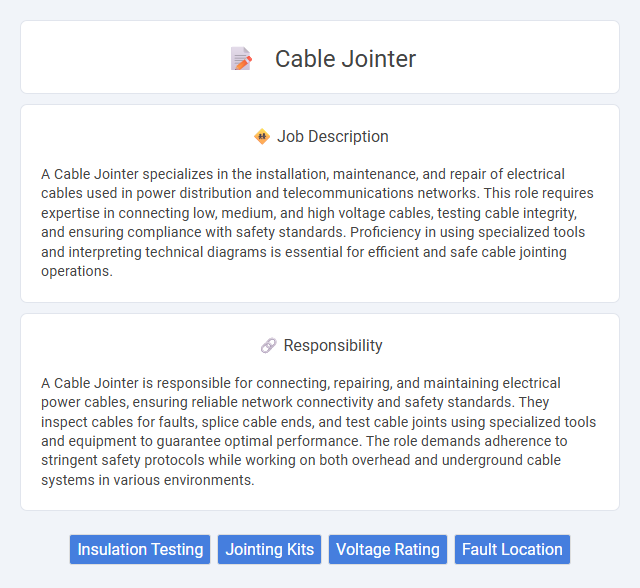
A Cable Jointer specializes in the installation, maintenance, and repair of electrical cables used in power distribution and telecommunications networks. This role requires expertise in connecting low, medium, and high voltage cables, testing cable integrity, and ensuring compliance with safety standards. Proficiency in using specialized tools and interpreting technical diagrams is essential for efficient and safe cable jointing operations.
Cable Jointers likely require strong physical fitness and good hand-eye coordination due to the demanding nature of handling cables and tools in various environments. Individuals with a preference for outdoor or industrial settings and an ability to work safely under potentially hazardous conditions may find this job suitable. Those prone to discomfort with heights, confined spaces, or manual labor might be less suited for this role.
Qualification
A Cable Jointer must possess technical qualifications such as an electrical engineering diploma or certification in cable jointing and splicing. Proficiency in interpreting electrical diagrams and safety standards, along with hands-on experience in handling high-voltage and low-voltage cables, is essential. Certification in health and safety procedures and a valid cable jointing license enhance job eligibility and career prospects.
Responsibility
A Cable Jointer is responsible for connecting, repairing, and maintaining electrical power cables, ensuring reliable network connectivity and safety standards. They inspect cables for faults, splice cable ends, and test cable joints using specialized tools and equipment to guarantee optimal performance. The role demands adherence to stringent safety protocols while working on both overhead and underground cable systems in various environments.
Benefit
Cable jointer jobs likely offer numerous benefits including competitive salaries and opportunities for career advancement within the electrical and telecommunications industries. There is a probable increase in job stability due to consistent demand for skilled workers to maintain and repair power and communication cables. Workers often enjoy hands-on work environments with possibilities for overtime pay and gaining specialized technical skills that can enhance future employment prospects.
Challenge
Cable Jointer roles likely involve complex challenges due to high voltage electrical systems requiring precise technical skills and safety awareness. The probability of encountering unexpected faults and environmental hazards such as adverse weather conditions may increase job difficulty. These challenges demand adaptability and continuous problem-solving to ensure efficient and secure cable connections.
Career Advancement
A Cable Jointer's role involves installing, maintaining, and repairing electrical cable systems critical for utility and infrastructure projects. Career advancement opportunities include progressing to senior technician, supervisor, or project manager roles, often supported by gaining certifications in high-voltage systems and specialized equipment handling. Continuous skill development in fiber optics, underground cable technology, and safety compliance enhances job prospects and salary potential in the electrical power and telecommunications industries.
Key Terms
Insulation Testing
Cable Jointers perform critical insulation testing to ensure the integrity and safety of electrical connections in power distribution networks. Using specialized insulation resistance testers, they measure the resistance between conductors and ground to detect potential faults or degradation in cable insulation. Accurate insulation testing by Cable Jointers prevents electrical failures, reduces downtime, and ensures compliance with industry safety standards.
Jointing Kits
Cable Jointer job involves installing, maintaining, and repairing electrical cable connections using specialized jointing kits designed for various types of cables, such as LV, MV, and HV cables. Jointing kits contain insulation materials, connectors, sealing compounds, and heat shrinkable tubes to ensure secure, waterproof, and durable cable joints that prevent electrical faults and signal loss. Expertise in selecting appropriate jointing kits and proper application techniques is essential for maximizing cable performance and ensuring safety compliance in power distribution networks.
Voltage Rating
Cable jointers specialize in connecting electrical cables to ensure consistent power transmission across networks. Their expertise includes handling cables with various voltage ratings, typically ranging from low voltage (up to 1 kV) to high voltage systems (up to 33 kV and beyond). Proper understanding of voltage rating is crucial for cable jointers to select suitable insulating materials and maintain safety standards during installation and maintenance tasks.
Fault Location
Cable Jointers specialize in fault location by accurately identifying breaks or defects in underground and overhead cables using advanced testing equipment such as Time Domain Reflectometers (TDR) and fault finders. They analyze signal deviations and insulation resistance to pinpoint faults, enabling efficient repairs and minimizing service disruptions. Their expertise ensures the reliability and safety of electrical distribution networks through precise fault diagnosis and restoration.
 kuljobs.com
kuljobs.com